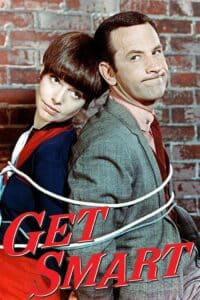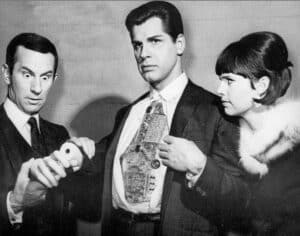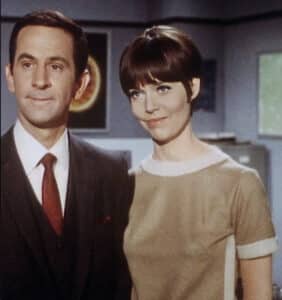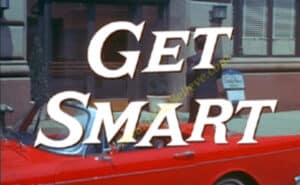In creating an unforgettable masterpiece, “Get Smart†combines comedy and espionage in its legendary television series. In the 1960s, this revolutionary series, created by the duo of Mel Brooks and Buck Henry, debuted amidst Cold War tensions. It gave a comedic and whimsical interpretation of the traditionally serious spy fiction genre. The show initially aired on NBC, but later switched to CBS, where it enjoyed continued success for five seasons and attracted a larger audience. The skillful combination of humor and spy-related drama in “Get Smart†made it beloved by viewers and a lasting influence on comedy TV shows and spy narratives.
The comedic formula of “Get Smart†that cleverly mocked the tropes and conventions of the spy genre is what can be attributed to its success and appeal. By following the adventures of Maxwell Smart and the capable Agent 99, the show cleverly mocked and honored the spy tales that fascinated the public. The show’s widespread popularity and acclaim can be attributed to its unique blend of satire and sincerity, as well as its inventive use of gadgets and slapstick humor. Consequently, “Get Smart†not only became a cultural phenomenon but also paved the way for comedy on TV, inspiring a new generation of writers to push the limits of humor in spy-themed content and beyond.
“Get Smart†became a landmark moment in television comedy, all thanks to Mel Brooks and Buck Henry’s innovative thinking. Their collaboration resulted in a series that seamlessly combined espionage and humor, providing an entertaining viewing experience. Both Brooks and Henry, known for their cleverness and imaginative narratives, gave “Get Smart†a satirical twist that mocked the seriousness of spy dramas during the Cold War. This method didn’t just captivate viewers but also created a new comedy genre that has had a significant impact on numerous productions. They were brilliant at subverting the spy genre by introducing the clumsy secret agent Maxwell Smart and his iconic gadgets, forever defining the show’s legacy.
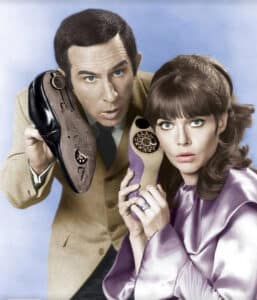
The remarkable ensemble cast of “Get Smart†added humor, wit, and espionage to the show. Don Adams, playing the bumbling yet skilled secret agent Maxwell Smart, was at the forefront and became an icon. Adams’ ability to time his jokes perfectly, combined with his unique way of delivering lines and catchphrases like “Would you believe?â€â€ and “Sorry about that, Chief,†earned him widespread acclaim and three Emmy Awards for Outstanding Lead Actor in a Comedy Series. His performance forever influenced the comedy genre and was crucial to the series’ success.
Agent 99, played by Barbara Feldon, brought intelligence, sophistication, and calmness to balance Maxwell Smart’s erratic behavior. Feldon’s performance shattered stereotypes and won over audiences, making her portrayal iconic. Edward Platt, the Chief of CONTROL, provided a sense of authority and comedic timing while managing Smart’s mishaps and leading his top agents. The chemistry among the cast, particularly Adams and Feldon, brought depth to “Get Smart,†making it more than just a comedy but a heartfelt show with developed characters and lasting charm.
The TV show “Get Smart†is known for its groundbreaking inclusion of gadgets, catchphrases, and memorable characters that have become part of popular culture. The show was innovative in its use of zany gadgets that parodied the spy genre, like the shoe phone that showcased its creative ingenuity. Maxwell Smart’s shoe-contained device was a clever representation of the show’s mix of spy activities and humor. The Cone of Silence, while meant to enable confidential talks, ended up causing humorous misunderstandings. The series’ inventive humor and satire of the spy genre were highlighted by gadgets such as the laser ring and explosive dental floss.
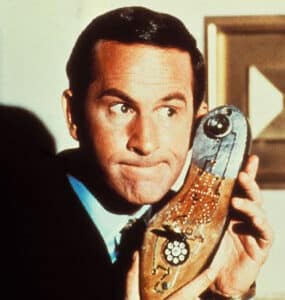
“Get Smart†has not only made a lasting impact on TV comedy, but has also won numerous awards, including seven Primetime Emmy Awards. The recognition applied beyond its original run. Don Adams, the lead actor in “Maxwell Smart,†was recognized by critics and awarded three Emmys for his performance.
“Get Smart†has enjoyed lasting popularity that sets it apart from most shows, even after its original broadcast from 1965 to 1970. The series has reached new audiences across different generations through syndication and availability on streaming platforms. The fact that the show continues to attract viewers is proof of its smart writing, unforgettable characters, and universally appealing humor. “Get Smart†remains popular with viewers due to its iconic shoe phone and Maxwell Smart’s lovable incompetence, proving that timeless comedy resonates.
“Get Smart†has left a cultural mark that extends beyond these direct adaptations. Many other TV shows, movies, and even video games pay tribute to it, showing how influential it is in pop culture. Expressions like “missed it by that much†and the humorous use of gadgets have become widely recognized elements of the series’ enduring influence. Fan conventions, merchandise, and online communities demonstrate the thriving “Get Smart†fan base. These forums not only pay tribute to the original series but also foster discussions that maintain its relevance. The continued popularity of “Get Smart†is due to both nostalgia and admiration for its unique humor and satirical take on the spy genre.
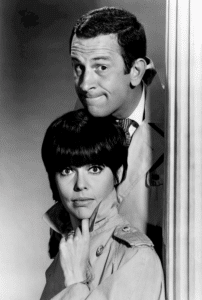
The characters’ universal appeal and the humor’s timeless quality are what make “Get Smart†so popular. The writing is made clever by the inclusion of catchphrases like “Would you believe?â€â€ and slapstick scenarios, resonates with audiences seeking both nostalgia and quality entertainment. By playfully mocking spy genre conventions and still caring deeply for its characters, the show breaks new ground in TV comedy. “Get Smart†is a timeless part of contemporary pop culture, thanks to its perfect balance of satire and character-driven storytelling.
WPRNPublicRadio.com is a Tampa, FL-based independent public radio platform to inform and entertain, bringing narratives driven by personal stories, connecting listeners to life, along with news and off-beat stories focusing on book readings, essays, arts and culture, and artistic sound portraits. Visit our website to learn more.

